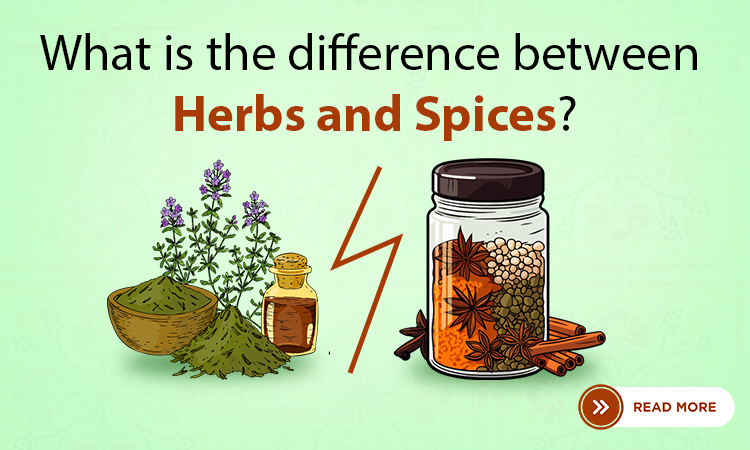The vocabulary used in the culinary arts is as varied and rich. Two phrases frequently used interchangeably but have different meanings are “herbs” and “spices.” These amazing plants improve the flavor of our food and also have historical cultural and therapeutic significance. In this blog, let us understand the minor but crucial differences between herbs and spices.
Understanding Herbs
The leafy green sections of plants that are utilized in cooking, medicine, and even aromatherapy are called herbs. Their main source is the foliage of plants, classified as herbaceous. Consider the powerful parsley, the aromatic basil, or the adaptable cilantro. Although they can be dried for longer use, herbs are most commonly used fresh. They have different tastes that entice our palates, ranging from subtle to strong.
What Sets Spices Apart
On the other hand, spices are aromatic materials that are extracted from different plant components, including fruits, bark, seeds, and roots. These give our food warmth, richness, and complexity. Imagine the fiery zest of ginger, the earthy richness of cumin, or the piquant allure of cinnamon. In contrast to herbs, spices are usually ground and dried before use. It intensifies their flavor and makes them a flexible addition to different recipes.
Global cultures and cuisines have been profoundly influenced by both herbs and spices. These plant riches have influenced culinary cultures for ages, from the delicate elegance of French fineherbs to the exotic enchantment of Indian curry blends. They enhance our gastronomic experiences and link us to far-off places and civilizations by bringing stories of discovery, trade routes, and the blending of many culinary traditions.
Medicinal Properties
Herbs and spices are also valued for their therapeutic qualities. There are many medicinal advantages associated with these natural marvels. These include improving immunity to relieving digestive disorders. Ayurvedic practitioners highly value turmeric for its anti-inflammatory qualities and peppermint for its ability to reduce nausea and facilitate digestion. The harmonious combination of tastes and health advantages contained in these botanical wonders highlights their importance to our well-being.
Conclusion
Herbs and spices are the foundation of flavor, scent, and cultural history in the complex tapestry of culinary inquiry. Although both aim to improve our culinary creations, their distinct origins, applications, and flavor profiles add complexity and variety to our culinary explorations. So, appreciate the subtleties of the herbs and spices on your plate and be amazed by the botanical symphony they create.
Earthen Connect, offers authentic spices ranging from Lakadong Turmeric and King Chilli to Cumin and Cinnamon Powder. We source our spice from dedicated farmers who practice sustainable agriculture. To assure customers of the authenticity of our products, we follow food traceability and transparency. To taste the authentic flavor of spices, buy natural spices from Earthen Connect.

